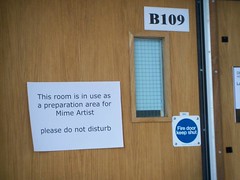Archives: September 2007
25/09 HD on Freeview
BBC News (and others) report that the BBC Trust has provisionally approved the launch of a High Definition service on Freeview. Since the hypothetical audience for this blog is a bit more techy than that of news.bbc.co.uk, I thought I might expound slightly.First of all, you have to bear in mind that rearranging the services on Freeview is a very complicated business. (The same is true of any UK digital TV platform, but Freeview is particularly hard because the available spectrum is so limited.) The platform is made up of six "multiplexes" (each of which takes up the same spectrum as one analogue TV channel), and each multiplex contains four or five TV channels, plus some radio stations, maybe some space for interactive TV applications, and some Service Information (SI) data that tells receivers what channels exist, where they are, what's on them, etc. We can't shift channels around willy-nilly, because the architecture of the platform contains a lot of underlying assumptions. For example, BBC One comes in fifteen different flavours, one each for Scotland, Wales, Northern Ireland and the twelve English Regions. This means that the multiplex that carries it cannot be created once and then broadcast from every transmitter, but that a different version of that multiplex must be routed to each transmitter. Obviously you can't simply move that service from one multiplex to another without making significant changes to the way you generate and encode your television streams.
Secondly, an HD service requires as much bandwidth as three to five SD services. The BBC HD trial was being broadcast at 17Mb/s last time I checked, although it may have dropped slightly since. Ofcom believe that 12Mb/s is achievable. Either way, you can't make room for an HD channel without displacing multiple SD channels. (There's an extent to which this problem has been made worse by the progressive lowering of channel bitrates on some Freeview multiplexes. A single HD channel, which has to be broadcast at a bitrate high enough to justify having it in HD at all, takes up the space of more SD channels than would once have been the case.)
What this leads to is a minefield for anyone who wants to provide an evolutionary way to get HD programmes onto a legacy platform. Sky and Virgin Media have a huge advantage here - they control the whole system end-to-end *and* they have much more bandwidth to play with. An HD service for them is a matter of adding a few extra multiplexes and selling internally developed HD-capable set-top boxes. Freeview (and soon Freesat, too) is an open platform. People who already own SD Freeview boxes don't want to lose out due to the introduction of an HD service that they may not want. But people who go out and buy HD Freeview boxes will want HD broadcasts to receive with them.
To complicate things further, Ofcom have announced that they don't think that extra spectrum should be reserved for an HD service after Digital Switchover completes in 2012. According to the article, they believe that at that point, four HD services could be provided using "DVB-T2", a future standard that would require new set-top boxes (and possibly new aerials, if DVB-T2 uses the polarisation MIMO technology I wrote about a few months ago).
So the BBC Trust have a dilemma. A BBC HD (trial) service is already running on satellite and cable, and last year's closed trial in London showed that it was entirely feasible to deliver HD via Freeview. But there won't be spectrum available for a nation-wide Freeview HD service until 2012, and it might use a technical standard that doesn't exist yet, so forward-compatible set-top boxes can't be made yet. A compromise option is available: sacrifice a few existing services between 2am and 6am each night and broadcast an HD service then. This would only really be useful to people with HD PVRs, of course. But if you start providing such a service now, then people buy HD-capable Freeview boxes that might not be able to receive HD after 2012.
It'll be interesting to see what they decide.
17/09 Warning: Mime Artist

Seen on a door at Kingswood Warren, the BBC's R&D HQ. The mime artist was called Stuart. He was nice.